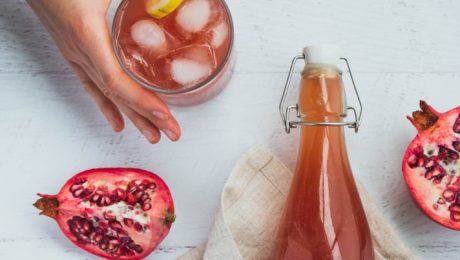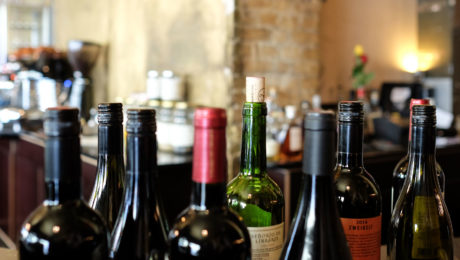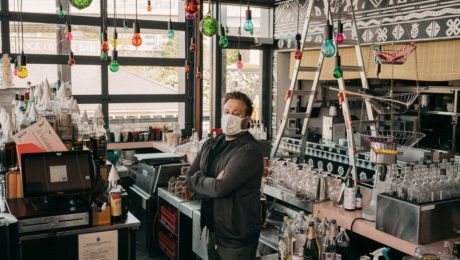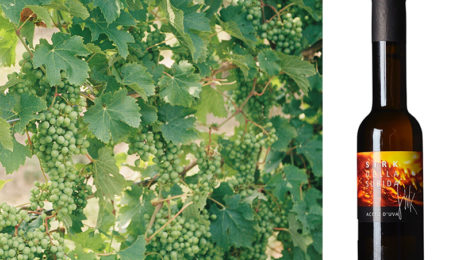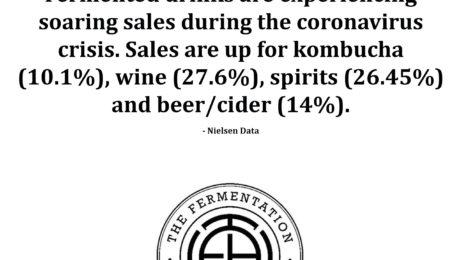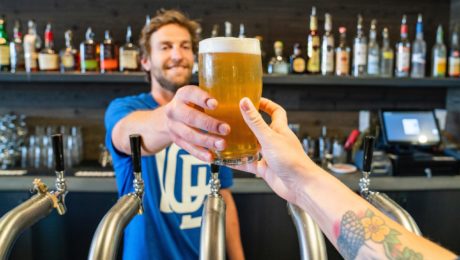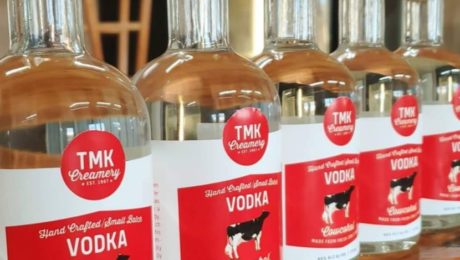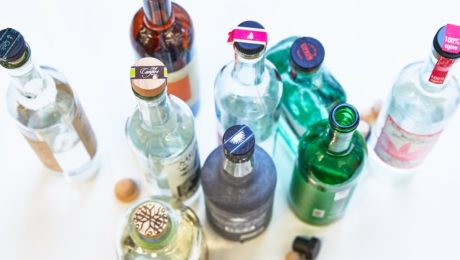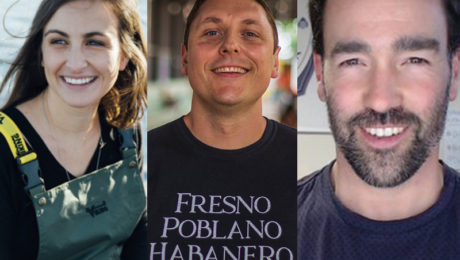Hard Kombucha is 2020’s Summer Drink
Hard kombucha is the drink trend of 2020, declares lifestyle and news publication Well + Good. Calling hard kombucha “your new summer drink of choice,” the publication points out that the fermented tea has less sugar and fewer carbs than traditional beer, wine and cocktails. Hard kombucha is made by adding more sugar and more yeast to the SCOBY than traditional kombucha, yielding a drink with a higher alcohol content.
Read more (Well + Good)
- Published in Business, Food & Flavor
New Tariffs Threaten Wine & Spirits Industry
Leaders of the wine industry are asking the community to rally and appeal tax hikes. As the industry continues reeling from losses related to COVID-19, a new round of potential tariff hikes threatens the industry. In 2020, a 25% tariff imposed on certain European wines and cheeses was described by some as the greatest threat to the wine and spirit industry since the prohibition era. U.S. President Donald Trump imposed the tariffs in retaliation for a tax imposed in France on several large American tech ferns, such as Facebook, Google and Airbus.
Read more (Vinepair)
- Published in Business
Craft Breweries Once Surging, Now Shuttering
Craft breweries, which were heading into their second decade of a major boom, are now shuttering during the coronavirus pandemic. “There’s going to be a lot of dead distilleries coming out of this,” said Paul Hletko, the founder and distiller of FEW Spirits, in Evanston, Ill. “Even if you survive, the new normal is going to be punishing for small brands.” Craft distilling relies on bars, tasting rooms, face-to-face sales and customers willing to pay a higher price for a premium product — all factors dramatically changing with social distancing and a global recession.
Read more (The New York Times)
- Published in Business
Fermented Grapes Make “Orange Wine” of Vinegars
The new innovation in vinegars is grape vinegars. Grape vinegar is made from grapes macerated and slowly allowed to ferment with their skins for a year. “The fermented juice then spends several years in small oak barrels to evolve into the delicately fruity pinkish vinegar,” according to the New York Times. The white grapes and skin contact is why the grape vinegar makers call it to the “orange wine” of vinegars. The latest grape vinegar collection comes from Sirk in Friuli, a region in northeast Italy. The grapes grown there, Ribolla Gialla white grapes, are prized for wine making.
Read more (New York Times)
- Published in Food & Flavor
Sales of Fermented Drinks Soar During Coronavirus
Fermented drinks are experiencing soaring sales during the coronavirus crisis. Sales are up for kombucha (10.1%), wine (27.6%), spirits (26.45%) and beer/cider (14%). (Nielsen Data)
- Published in Business
New CARES Act Provides Stimulus to Breweries, Cideries
Craft alcohol producers, who asked the government for assistance this month, may now obtain SBA loans interest free to help maintain payroll, mortgage, rent and utilities during the coronavirus outbreak. The CARES act was designed to incentivize small businesses to avoid layoffs. Craft breweries and cideries who were forced to close breweries, bars, wineries and taprooms this month during the coronavirus outbreak. The Emergency Disaster Loans will provide assistance up to $10,000. ..Both the Brewers Association (BA) and the American Cider Association praised the stimulus package, but noted it’s not perfect.
“This this is a significant step forward that provides much needed relief for small and independent breweries who are facing dire economic challenges, there is more work to be done,” according to a statement by the BA.
Read more (Beverage Daily)
- Published in Business
Fermenting “Cowcohol”
Oregon-based TMK Creamery is using the leftover whey byproduct from their cheese and fermenting it into vodka. They call it “cowcohol” and the flavor has a carmel-like sweetness with a smooth finish. Owner Todd Koch learned about the method from Dr. Paul Hughes, assistant professor of Distilled Spirits at Oregon State University. Hughes began experimenting with fermenting whey into a spirits base and has now helped more than a dozen creameries all over the U.S. ferment their whey into alcohol.
Fermenting upcycles the whey while bringing some attention to the animals, Koch said. Artisanal creameries typically have to pay thousands of dollars to dispose of whey in landfills.
From Atlas Obscura: Whey fermentation offers a brave, new world for small creameries, both in decreasing their environmental footprint and ensuring financial security in an age of mass conglomeration. For Koch, a life-long, self-proclaimed “cow person,” the possibilities of bovine booze are a relief to him and his beloved herd. “Going through college, I was like ‘Man, if I could just figure out how to get cows to make alcohol, we’d be set,’” he says. “So I guess we’re one step closer here.”
Read more (Atlas Obscura)
More Entrepreneurs Enter Craft Mezcal Business
Mezcal, once deemed the next big thing, is “radically different” in 2020. The New York Times style section explores the amount of entrepreneurs entering the craft mezcal business. Mezcal is an alcoholic drink, distilled with fermented agave. “While some bigger mezcal brands exist, most are still small-scale, with tiny outputs. Tequila production is largely industrialized, at least for the brands available in the United States, but mezcal is still the equivalent of homespun,” according to the New York Times.
Read more (New York Times)
- Published in Business
Bubbling Over: Is Fermentation More Than a Fad
We asked three fermentation experts if recent popularity of fermented foods is a fading trend or a new food movement. These industry professionals weigh in on their predictions for fermentation’s future. The fermenters include: Bri Warner (CEO of Atlantic Sea Farms, a commercially viable seaweed farm that makes kelp kraut and kimchi), Nicholas Gregory (owner of Pulp Hot Sauce, an Atlanta-based fermented condiment brand), Joshua Rood (co-founder and CEO Dr Hops Kombucha beer, a health-conscious alcohol).
Do you think the surge of fermented food and drinks is a trend will disappear or a new food movement here to stay?
Bri Warner, CEO Atlantic Sea Farms: “Now that we have a robust understanding of how good gut health effects overall health, I think fermentation is here to stay. I do think the category will continue to innovate to remain relevant, with a stronger focus on quality ingredients that are good for people, planet, and, in our case, oceans!”
Nicholas Gregory, owner Pulp Hot Sauce: “I think the current fermented food movement is here to stay. We are at an intersection of technology, science and health further than we have ever seen in human history. The internet, television, several seminal books and air travel have given us unprecedented exposure and access to information. This exposure and access to food and world cultures is more in depth than ever before. Including the food history and traditions of those cultures. Combine that awareness with a relatively intelligent and sophisticated medical system; an understanding of healthy lifestyles, a willingness to make healthy decisions, an understanding of the benefits of a healthy gut biome and how it all correlates to a longer, happier, healthier life. Along with a craving for umami and fermented funky flavors for a growing number of the population. I believe we are in the middle of a movement that shows no signs of slowing down or going away anytime soon. In fact, I see it only becoming more popular, more normal, more accepted, more diverse, more creative and more exciting in the decades to come.”
Joshua Rood, co-founder and CEO Dr Hops Kombucha beer: “As co-founder and CEO of Dr Hops Kombucha Beer, I appreciate that there is currently a powerful trend towards living, fermented foods. But answering the question of whether or not that will continue is repugnant. We here at Dr Hops are driving that trend! We are not playing the game of hoping that it will simply continue. We are committing ourselves, each day, to the life-enhancing awesomeness of fresh, authentic, fermented foods and beverages. Please join us in that! Join us in leading the health-conscious food and beverage revolution!”
- Published in Business
Bottoms Up! Scientists Find Gut-Friendly Bacteria in Unpasteurized Beer
The same beneficial gut-friendly bacteria prevalent in yogurt is also in some beer, according to new research from scientists at Amsterdam University. Beer brands that ferment twice — once at the brewery, then a second fermentation in the beer bottle — are rich in probiotic yeast. This creates a sharp, dry taste in the beer that is “bursting with probiotic microbes.” Scientists found the brands using in-bottle fermentation use a different strain of yeast than traditional brewer’s yeast. Pasteurized beer and modern beer production processes have no probiotics. Their findings are supported by researchers from the University of Nebraska, who also found some beers contain a high amount of good probiotics. Professor Eric Classeen, a gut bacteria expert from Amsterdam University, said “You are getting a stronger beer that is very, very healthy. … In high concentrations, alcohol is bad for the gut but if you drink just one of these beers every day it would be very good for you.”
Read more (The Telegraph)
- Published in Science

